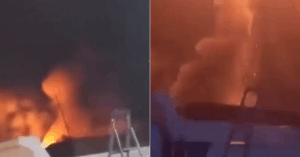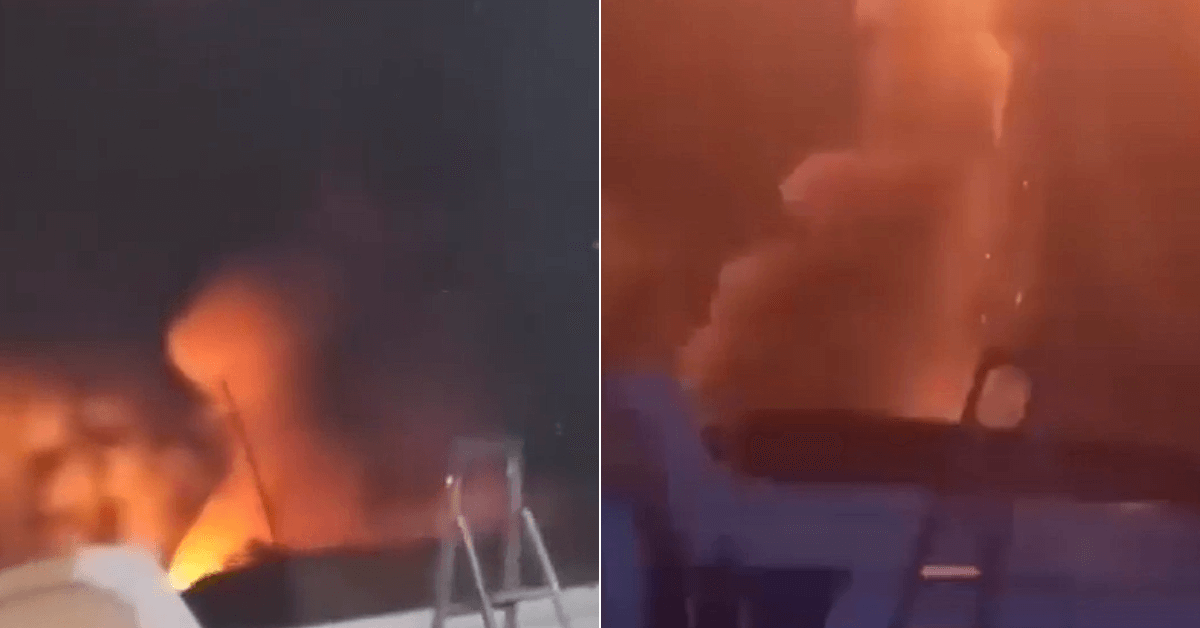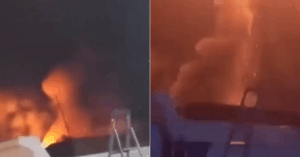
Oil Tanker & Cargo Ship Catches Fire, Killing Captain & Injuring 2 Crew Members
August 16, 2025
China Delivers Third Hangor-Class Submarine To Pakistan In $5 Billion Deal
August 18, 2025

The Israeli Navy carried out a missile strike against an energy facility south of Sanaa, the capital of Houthi-controlled Yemen. The strike targeted the Haziz power station, which was the last operational electricity source for the city.
According to the Israel Defense Forces (IDF), the attack was launched from nearly 2,000 kilometers away and aimed at “energy infrastructure used by the Houthi terrorist regime.”
Israeli defense officials said the strike was carried out by Navy missile boats, marking only the second time that Israeli warships have been used to hit targets in Yemen. Most of Israel’s earlier attacks on the Houthis were launched by fighter jets or drones.
The operation was a response to repeated Houthi strikes against Israel. On August 14, the Houthis claimed they had fired a ballistic missile at Ben Gurion Airport and launched six drones toward Israel.
The IDF said the missile was intercepted before reaching Israeli territory, one drone was shot down south of Eilat, and the other five have not yet arrived.
Early on Sunday, just hours after Israel’s strike, the group fired another ballistic missile toward Israel, which was also intercepted without causing casualties or damage.
Israeli Defense Minister Israel Katz warned that those who attacked Israel would face “strong and painful” consequences and declared that “whoever raises a hand against Israel, his hand will be cut off.”
Local media in Yemen reported at least two explosions in southern Sanaa. Yemeni sources said the blasts hit the Haziz generating plant, causing power cuts across the capital. Mashal al-Rifi, CEO of the Sanaa Electric Corporation, told reporters that the facility “was under attack, causing a temporary power outage.”
المشاهد الأولى للانفجارات العنيفة التي هزت #صنعاء وسط أنباء عن غارات إسرائيلية استهدفت محطة كهرباء “حزيز”
للمزيد | https://t.co/8OJyKYAFaH#إرم_نيوز #اليمن pic.twitter.com/c0KY0uHcCw
— Erem News – إرم نيوز (@EremNews) August 17, 2025
Houthi-run Al Masirah TV said the strike knocked generators out of service in the Sanhan area and forced operations to halt. A civil defense source cited by the channel confirmed that firefighting teams were deployed to extinguish flames. Residents shared social media videos showing large fires and a distressed population.
Houthi political bureau member Hazam al-Asad condemned the strike on social media, accusing Israel of “targeting only civilian service facilities like electricity and water.”
Military analysts said that the use of Israel’s Saar-6 corvettes for the strike shows the Navy’s ability to conduct deep, long-range attacks beyond coastal operations. The vessels are believed to have fired the Blue Spear missile, a land-attack version of the Gabriel anti-ship missile.
The Blue Spear is said to have a range of up to 300 miles and carries a 150-pound warhead. Ukraine is currently believed to be working on a reverse-engineered version of the same weapon.
The Navy’s role provides Israel with a cost-effective and low-risk option compared to sending manned aircraft 1,250 miles down the Red Sea. Such air missions require F-16 strike jets, surveillance, refueling and rescue aircraft, and suppression of air defense systems, all of which put aircrew at risk.
While drones such as the IAI Heron TP Eitan and Elbit Hermes 900 Kochav could be used, the Houthis have previously shot down drones over land, making them more suitable for strikes on coastal or harbor targets. Naval missile launches, by contrast, leave almost no warning signs and reduce exposure.
This was the 14th Israeli strike on Houthi-controlled areas in Yemen since November 2023. Several of those strikes have also targeted energy infrastructure.
The Houthis have continued to attack Israel with missiles and drones. Since March 18, when the IDF resumed its offensive in Gaza, they have launched 69 ballistic missiles and at least 22 drones toward Israel.
Earlier, during a ceasefire in January 2025, they paused their fire after launching more than 40 ballistic missiles and dozens of drones, including one that killed a civilian and injured others in Tel Aviv in July.
The Houthis, who are backed by Iran, say their attacks are carried out in support of Palestinians during the Gaza war. Their official slogan calls for “Death to America, Death to Israel, [and] a Curse on the Jews.”
References: firstpost, Reuters
Source: Maritime Shipping News


